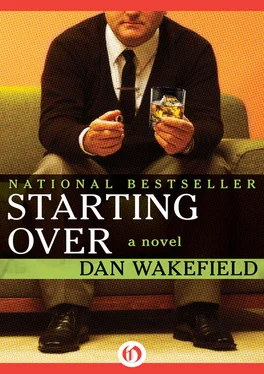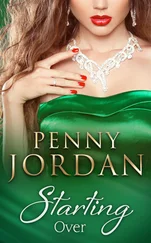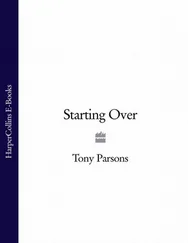Shell returned, and asked if Potter and Gafferty would like to come with him to a meeting of what he implied was a small, elite, highly intellectual group of film buffs who met at one of the Harvard houses on Monday nights and watched a private screening of a movie that they then discussed. Gafferty said he had to be home for dinner or there’d be a big commotion, and he gave a secret, knowing look to Potter. Potter gave a quick wink back, as if in chummy collaborative approval.
Marilyn wouldn’t be getting in till the next day, and since he had nothing on for the evening Potter said he’d go with Shell to the film buff meeting. Potter asked if it was all right to stop in Harvard Square so he could pick up a bottle of Scotch to take along, if the buffs wouldn’t mind that.
“Sure, anything you like. It’s all very casual.”
The more that Shell stressed the casual nature of the thing, the more Potter realized what a big deal it was for him. Just getting together with some of the gang over at Harvard. What ho. Jolly good. Nothing to it.
Potter bought a fifth of Black and White, which he’d contribute to the group. He didn’t like seeing any kind of movie without being able to have a drink in his hand, and alcohol became all the more imperative if he was to sit through one of those arty jobs, probably foreign with subtitles or foreign and dubbed and all out of synch.
Much to his surprise, the movie being shown was an American comedy of the 1930s with Cary Grant and Katharine Hepburn. He and Shell arrived just after it had started, and sat down on the floor near the door. There were about a dozen people in the room, some on chairs or a couch, a few others cross-legged on the floor. Potter slipped into the kitchen, which fortunately was lighted, and made his necessary drink.
The plot of the movie revolved around a leopard, called Baby. It was quite funny, and the intellectual audience guffawed and snickered and giggled just like a regular Saturday Matinee crowd at the Bijou. When the lights went on there was even a bowl of popcorn passed around, and beers were flipped open.
Potter soon learned, however, that this seeming light comedy bore historical and artistic implications far beyond its humor and entertainment value. It was Bringing Up Baby , directed by Howard Hawks, who had been rediscovered as one of the foremost directors. Hawks was heavy now, and his films thus merited the kind of dissection and analysis that literary critics lavished on the Duino Elegies . Lighting was discussed, and camera angles, editing, sound effects, dialogue. There was even a heated debate over whether the two leopards in the movie were played by the same leopard, or by different leopards. The leopard or leopards came in for praise, and someone realized that it was probably the trainer who deserved the credit for the leopard performance.
“I wonder,” someone asked, “when the first animal trainer came to Hollywood.”
“That would be a fascinating line of research,” said the host, a guy named Chip Strider, who was Senior Tutor of this particular Harvard house.
Potter could envision it: a whole Ph.D. thesis on the first animal trainer who came to Hollywood, and his influence on the art of the film. Potter had consumed three good Scotches, and he could not resist raising his hand.
“Actually,” he said, “the first animal trainer who came to Hollywood was Joseph R. Scrotz, a Russian émigré.”
All heads turned toward him, in respectful attention. He couldn’t just say “Hey, fellas, I was only kidding.” He had to carry it on.
“Scrotz,” he said, “had worked throughout Europe with the old Budapest Circus, but came to this country for political reasons after the 1917 Revolution, and signed with Ringling Brothers. He was retained by Von Stroheim to work on a silent version of Kipling’s Mowgli , which was never released, but his value was obvious and he stayed on with the old Mecca studio.”
Ed Shell was surprised, and the others were impressed by Potter’s apparent familiarity with arcane film history. Chip Strider said he must come to dinner at the House sometime.
When Marilyn returned from her Virgin Island idyll, she was nicely tanned, and perceptibly radiant—more so than Potter had ever seen her. She gave him a hug, and a bottle of Appleton Brothers Rum. “Herb said this was the best,” she explained.
“It must be then. Here—let’s break it open. From the way you look, we can celebrate.”
They settled down on her couch with the rum Herb said was the best, and Marilyn purred her account of the wonderful beach house where they stayed in St. Thomas, the gourmet meals in town, the moonlight walks at the edge of the surf, frozen daiquiris for breakfast, fucking that matched the mood and the scenery, hand-in-hand rapport, sharing the same kind of humor and pleasures, swimming in the waves, peaceful silences, watching the great liners dock on their winter cruises.
“But that wasn’t the best thing,” she said.
“Oh?”
Marilyn grinned, poked a finger in her drink, and rolled her tongue on it, licking at the rum. “He mentioned it,” she said. “I never brought it up. He did.”
“It?”
“Marriage.”
“He asked you to marry him?”
“I didn’t say that. I said he brought it up. Marriage.”
“How do you mean, ‘brought it up’? In general? A discourse on the future of the institution?”
“He said he’d give anything to be able to marry me.”
“He might have to, when he’s finished with alimony and child support.”
“He’s aware of all that. It will be difficult, naturally. It will take some doing. And, of course, some time.”
“Of course. Did he say how much?”
“You said I shouldn’t press him. I just let him talk.”
“OK, fine. When do you see him again?”
“Next weekend.”
“How? Where?”
“He wants me to come down to New York. He’ll get me a hotel room, and be there with me as often as he can get away, without anything looking suspicious.”
“Mmmm. He’s footing the bill, of course.”
Marilyn stretched, smiled, and said, “Of course.”
“Mmmm,” Potter said. “So far, so good.”
“No,” she said. “So marvelous.”
“I stand corrected.”
“Phil?”
“Yes?”
“What do you think my chances are? Realistically?”
“Goddamn it, I’m not Jimmy the Greek and I’m not making odds on people’s lives!”
His anger was not so much because of the question as because of his fear that the odds on Marilyn’s dream would not be reassuringly high.
“The odds are,” Gafferty said, “that the first party is for the losers, guys like me who don’t have their Ph.D.”
“That’s ridiculous,” Potter said, “Ed and I are invited to the second party and neither of us have our Ph.D.”
“Ah!” Gafferty whispered, leaning forward, “but Dean Hardy no doubt thinks you both have the capability and drive to go on and eventually get the degree, even though you don’t have it yet!”
“Wait a minute,” Shell said, “if the first party is for the losers, why would they be invited first? If you ask me, the second party is for the people the Dean considers second-rate.”
“No, no,” Gafferty argued, “he wants to have the party for the losers first so he can get it out of the way, fulfill his obligation, and then be free to enjoy entertaining the people he likes at the second party.”
Hunched over a small table in the corner of the school cafeteria, Potter, Gafferty, and Shell were chainsmoking, nervously dropping unfinished cigarettes into half-filled styrofoam cups of coffee grown cold, and joining in the general speculation that was sweeping the faculty about the meaning of the two separate cocktail parties Dean Hardy was holding during the semester break. Like Kremlinologists, the teachers analyzed the hidden meanings of all that the Dean did and said, and special significance was placed on the invitation lists of his social functions, on the assumption that these provided pertinent clues to who was In and who Out. The fact that over the break he was giving two parties, inviting all faculty members to his home, but on separate nights, had given rise to a frenzied examination of the implications of which people were attending which party.
Читать дальше












